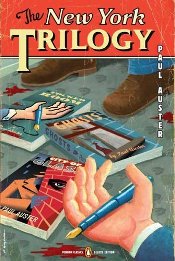
The New York Trilogy
By Paul Auster
Penguin Classics

Some people write. Some people detect. Some people write about others who Detect. Paul Auster writes about those who wonder what it all means. In your typical hardboiled detective novel, rye whiskey swilling, down-and-out, tough guys pump lead into ne’er-do-wells and keep you flipping pages well past bedtime. In Auster’s world, unpaid unprofessionals become absorbed in cases they don’t understand, can’t solve, and can’t let drop. He has created a genre the world probably doesn’t need – the existential cubist detective story.
We begin with “City of Glass,” in which lonely detective story author Quinn agrees to protect a young man from some poorly identified danger. The task degenerates into following a homeless man through the streets of New York as his route spells out the name of a famous biblical artifact. He never gets paid, and ends up living in an alley, obsessing over a person he never sees. Existentialism – 1. Gratuitous sex – 0.
There was some promise in this first story – the client is an attractive woman who gives Quinn an inappropriate kiss, but then evaporates. It’s disappointment that carries us on to story number two, “Ghosts.” In this dreary drama, detective Blue picks up a job shadowing another isolated fellow named Black. He abandons his fiancée for this job, and meets a series of characters named Gold, White, Brown, and Gold. The color name gag thins early, there’s a lot of discussion about Thoreau and Walden, and Blue’s target is just a man writing a novel. When a grateful moment of violence occurs, it resolves nothing. Plate tectonics offers more suspense.
The final story, “Locked Room,” begins slowly, then drags until Auster finally steps through the fourth wall and reveals the secret behind this project – life is pointless, this is the story of his mental journey, and nothing you do matters outside yourself, not even the tawdry sex scenes. At this point, you’d appreciate the verbal description of an accidental titty flash.
A good detective novel is a page turner, but I struggled to get though this novel. The cover is promising – Art Spiegelman gives us a dead hand holding a pen on a bloodstained street. The retro graphic cover comes pre-aged, complete with corner folds and scuffed edges. It’s a nice touch; my copy of this book is unlikely to age that gracefully. This is crime drama for the squeamish or a metaphor for driving from Dallas to Fargo. You think something interesting will happen soon, but after a while you wish you’d brought along a few more tapes for the player.
Penguin Classics: http://www.penguinclassics.com












